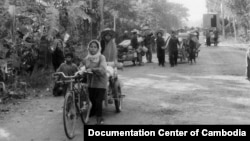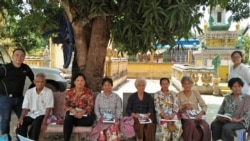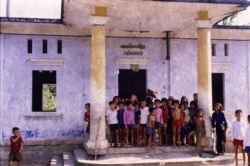Editor’s Note: Youk Chhang is the director of the Documentation Center of Cambodia. The Center's focus on memory and justice seeks to assist Cambodians in discovering the truths upon which a genuine national reconciliation depends. In this essay, Chhang asserts that Cambodia could do more to help survivors of genocide to receive reparations that involve restorative medical care, services, and support from the international community.
Justice is hard to realize in post-conflict societies because what violence, mass atrocities and genocide take, the world cannot replace. No amount of money can compensate for lives lost and no reparation can repair the damage done to society, which extends across multiple generations. It has been over four decades since the Khmer Rouge fell, and although Cambodia has made great progress in overcoming the shadows of this horrific history, there is so much more we can do for the survivors of the genocide. Although there are many institutions that stand out as prominent fields that harbor the residual effects of mass atrocities, the medical system is one institution that demands greater support, not only because of the poor state of affairs, which is all but exacerbated by the COVID-19 pandemic, but also because it is one way to directly improve the well-being of the survivors of the Khmer Rouge regime.
In Cambodia, the most prominent means for seeking justice for the deaths of millions of people during the Khmer Rouge regime has been the Extraordinary Chambers in the Courts of Cambodia (ECCC). Although the ECCC has fallen short in many areas, it nevertheless has accomplished a significant part of its mandate. The ECCC’s proceedings have shed light on what occurred during the Khmer Rouge regime, and it has prosecuted some of the most senior leaders and those most responsible for the crimes committed by the regime. However, though the work of the ECCC has been pivotal to the healing of the Cambodian nation, there must be other extra-judicial mechanisms and means for ensuring the ECCC’s work continues to have an impact on the younger generations that were born after the Khmer Rouge regime. Education is one way to ensure the work of the ECCC, and the history of the Khmer Rouge regime, is not forgotten.
Because justice is so hard to realize, and it is impossible to truly restore what has been damaged and lost, Documentation Center of Cambodia (DC-Cam) has prioritized education as a complement to the traditional forms of transitional justice. In many respects, genocide education can be a means for realizing a form of justice. DC-Cam uses its Genocide Education Program in a way that leverages its inherent capability to effect restorative justice as much as prevent the next mass atrocity and genocide. By its very nature, education can prevent future violence, conflict and even inhumanity because it challenges students to analyze history and reflect on how the conditions and circumstances that led to genocide and mass atrocities of the past can be prevented in the future. On a deeper level, all genocide education must impart a due sense of empathy for people, and how inhumanity can be instigated and even rationalized on individual, community, and national levels. However, education can also bring a sense of restorative justice in addition to preventing genocide and mass atrocities.
DC-Cam has used its Genocide Education Program as a platform to allow victims to tell their stories and experiences, and it has leveraged educational events as open forums for victims to confront former Khmer Rouge cadres for purposes of reconciliation. When education is packaged in this way, victims are given an opportunity to take back their humanity and self- and collectively reflect upon how their experiences can teach the next generation. Likewise, former Khmer Rouge cadres are given an opportunity to reflect on their history and come to a semblance of reconciliation with their community. Education in this sense becomes an opportunity for restoring and rebuilding the pieces of humanity that were damaged by mass atrocities.
But despite all of these significant benefits, DC-Cam understands that education is still limited, and more must be done to help the victims of mass atrocities and genocide. Cambodia continues to struggle to this day with the history of the Khmer Rouge period. Although politics, social institutions, and the economy stand out as prominent fields that harbor the residual effects of mass atrocities, the medical system also bears scars.
In 2015, Dr. Demosthenes C. Reyes, who is now an advisor to DC-Cam, wrote about the poor standards of medicine in Cambodia.1 A standard for quality medical care in the country is absent, and religious beliefs and superstition without scientific or medical basis form the foundation of most medical and surgical decisions. Moreover, the medical profession in Cambodia is still dominated by a materialistic attitude and a lack of compassion.
The Khmer Rouge regime is not necessarily responsible for the standard of medical care in Cambodia today, but there is little question that the Khmer Rouge decimated the medical profession in Cambodia. Professionals, academics, and experts, including doctors, were targeted for arrest, and the vast majority of the medical community either fled or died during the regime. By the end of the Khmer Rouge regime, medical care was non-existent in Cambodia, and only a handful of medical professionals were believed to have been still living in the country.
Likewise, the Khmer Rouge is also not the root cause for the qualities that resonate in many medical care services today; however, in every respect the regime perpetuated, aggravated, and increased Cambodia’s problems, one of which has been a pervasive culture of survivalism and self-serving behavior. Because Khmer Rouge ideology was centered on terrorizing the masses, a lack of compassion was an inherent attribute of Khmer Rouge administration. Compassion toward another person could be perceived as a compromise in one’s adherence to the Khmer Rouge ideology, and compromise always indicated weakness and a lack of enthusiasm, which were punishable by death. It was this cruel calculus that permeated all parts of Cambodian life during the Khmer Rouge regime, and the remnants of this mental calculus and perspective can still be seen in many professions and institutions where human compassion is a core ethic.
But apart from being a key tenet of Khmer Rouge ideology, the lack of compassion was also a common survival mechanism amongst victims and throughout Cambodian society. In the decades that followed the collapse of the Khmer Rouge regime, Cambodia was plagued by decades of war, famine, and instability, which all but perpetuated a culture where survival was paramount, and selfless service, sacrifice, and compassion for others was superseded by self-serving behaviors.
In 2014, I published a short article in the Phnom Penh Post about what I had learned from my sister Keo Kolthida Ekkasakh.2 As a witness to the horrors of Democratic Kampuchea (DK) – commonly known as the Khmer Rouge – and as a researcher who has worked for many years studying and documenting the stories of individuals who suffered and died under the Khmer Rouge regime, I felt like I understood most aspects of Khmer Rouge history. I also believed I had overcome some of the worst effects of this time period. But what struck me in connecting with my sister in 2014 was the fact that that I had also much to learn about the various ways this history has impacted the Cambodian people.
As a deaf person, no one bothered to ask my sister about her experience during the Khmer Rouge period. At that time, my sister was undergoing treatment for cancer, and so I re-connected with her about topics and experiences that we had never discussed before. She told me about her experience as a deaf person during the Khmer Rouge regime, and her stories made me embarrassed by how little I knew about her suffering. Her stories also made me realize how many other people with mental or physical disabilities have had to suffer alone. How many other life stories are forgotten, overlooked or are simply never told?
Keo Kolthida Ekkasakh passed away from cancer almost one year after my article was published and since that time, I have been haunted by the insights of her experience as a deaf person. Her story was only a small piece of Khmer Rouge history, but like others who do not have the capacity to speak, her story challenged me to really evaluate the definition of justice and whether we are really doing all that we can for those without a voice.
Shortly after my sister died, I published another article about how the Cambodian medical system fails the poor.3 In my sister’s final days, my family and I were able to provide her with the best care available in Cambodia, but the standard of care was still abysmal and marked by a lack of compassion. In my article, I stated,
I don’t believe my sister’s circumstances were isolated or unique. Had we not been at her side imploring the consistent attention to her care or inquiring into, with secondary medical opinion, her actual condition, I question how long she may have truly lived. The cool indifference to the poor or the casual triaging of medical care based on economic circumstance disguise a deeper sentiment than mere distraction, incompetence or laziness. The vestiges of horrific regimes can often reside in our own understanding, empathy and concern for our fellow human beings both in casual interaction as well as professional service, and it is in this light that Cambodia still has much more to do.4
Prompted by my late sister’s story and her experience with the medical services in Cambodia, since 2014, DC-Cam has been seeking to implement a program to support the health and welfare of the survivors of the Khmer Rouge regime.5 Working alongside Dr. Reyes, DC-Cam has drafted over a dozen proposals, concept notes, and white papers on the idea of supporting the health and welfare of the survivors of the Khmer Rouge regime. DC-Cam sees this effort as not only an extension of its Genocide Education Project, but also its work in supporting the ECCC and Cambodia’s development as a democratic country.
One of the first DC-Cam public commitments to realizing this project appeared in 2017. In 2017, DC-Cam published its Strategic Plan 2017-2020, in which it notified donors of its commitment to establishing a temporary health care clinic for ECCC’s civil parties.6 As stated in the plan,
The purpose of the clinic would be to provide a venue for a wide spectrum of mental and social health organizations, leveraging secular as well as faith-based institutions, to donate voluntary counselor and other social health services. Dr. Demy Reyes, a Christian pastor and oncology surgeon, and Késsara Chan, Ph.D in human physiology of Switzerland will supervise this work, by reaching out to other organizations in the country. The primary goal of the clinic is to leverage the wide variety of volunteer work already being accomplished in Cambodia for the purpose of achieving synergy toward improving the mental and social health of victims.7
In addition to the services that could be offered by the clinic, DC-Cam also proposed piloting a preventative health care project for survivors. Under this project, DC-Cam would provide a basic package of preventative health care and a limited range of curative interventions for a specific number of civil parties and criminal complainants. At the end of the pilot, the clinic would assess the effectiveness and sustainability of a program that provides basic health care services to survivors of the Khmer Rouge.
Since these initial proposals, DC-Cam has made progress in gathering data on the population that could be supported with health care services, and it has further refined the various strategies, objectives, and activities that could improve the health and well-being of survivors of the Khmer Rouge. Recently, we were delighted to learn of the U.S. Government’s support to Khmer Rouge survivors’ access to health and social services. In 2020, the U.S. Senate Committee on Appropriations provided funding authorization detailing the U.S. Government’s support to the Khmer Rouge survivors in the U.S. Congress’ Appropriations for 2021.
This support could not come at a better time. On 7 April 2021, the Pre-Trial Chamber of the ECCC issued its decision on the disposition and future of Case 003.8 Whereas the ECCC will continue to process and decide upon substantive matters, there seems little doubt that the ECCC is winding down, and the most prominent instrument for achieving justice for the victims of the Khmer Rouge is in its twilight phase.
It has been over four decades since the Khmer Rouge fell, and although Cambodia has made great progress in overcoming the shadows of this horrific history, there is so much more we can do for the survivors of the genocide. The support of the U.S. Government, the Cambodian government, and the world is not only crucial to helping the survivors of the Khmer Rouge, it is also pivotal to reimagining the concept of transitional justice in other countries as well.9
Transitional justice must include more than symbolic reparations; it must include actions that at least aim to improve the well-being of the survivors. Cambodia could be the first country since the Holocaust in which the survivors of mass atrocities and genocide receive reparations that involve restorative medical care, services, and support from the international community. We should recognize this effort to help the survivors of the Khmer Rouge as an admirable step forward, as well as the beginning of a new conversation on the definition of post-conflict justice.
______
1. Demosthenes C. Reyes, M.D., “Cambodia’s Failing Medical System,” [Letter to the Editor] The Phnom Penh Post, (Feb. 20, 2015), https://www.phnompenhpost.com/opinion/cambodias-failing-medical-system.
2. Youk Chhang, “Deafness and Genocide,” The Phnom Penh Post (Jan. 3, 2014), https://www.phnompenhpost.com/7days/deafness-genocide#:~:text=Youk%20Chhang%20is%20one%20of,different%20lives%20as%20genocide%20survivors.
3. Youk Chhang, “Our Medical System Fails the Poor,” The Phnom Penh Post (Jan. 29, 2015), https://www.phnompenhpost.com/opinion/our-medical-system-fails-poor.
4. Youk Chhang, “Our Medical System Fails the Poor,” The Phnom Penh Post (Jan. 29, 2015), https://www.phnompenhpost.com/opinion/our-medical-system-fails-poor.
5. See Dealing with the Past, Moving into the Future: 2014, 2015, 2016 Vision, Documentation Center of Cambodia (2014), http://d.dccam.org/Publication/Outreach/pdf/B_Dealing_with_the_Past.pdf. (“Between 2013 and 2015, DC-Cam will… focus on the needs of ordinary Cambodian people—victims and their descendants—who are the keys to the country’s past, present, and future. In addition to honoring those who died during the Khmer Rouge regime, it is crucial to reach out to and support living Cambodians in the country and around the world.”).
6. STRATEGIC PLAN 2017-2020, DOCUMENTATION CENTER OF CAMBODIA (2017), http://d.dccam.org/Publication/Outreach/pdf/B_DC-Cam_Vision_2017-2020.pdf.
7. STRATEGIC PLAN 2017-2020, DOCUMENTATION CENTER OF CAMBODIA (2017), http://d.dccam.org/Publication/ Outreach/pdf/B_DC-Cam_Vision_2017-2020.pdf.
8. Press Release, Extraordinary Chambers in the Courts of Cambodia (5 April 2021).
9. Youk Chhang, “Opinion in the Midst of a Global Pandemic, the Memory of Khmer Rouge Survivors is a Reminder of our Moral Obligations,” Voice of America (Apr. 17, 2020), https://www.voacambodia.com/ a/opinion-in-the-midst-of-a-global-pandemic-the-memory-of-khmer-rouge-survivors-is-a-reminder-of-our-moral-obligations/5376655.html?fbclid=IwAR3EOh8tdCLe7_ZnL0yn8zkWqhnmxVJIKcgINstr3lf4. (“I was approached by a survivor of the Khmer Rouge regime, and like many other persons talking to in the villages, she was fearful of the global pandemic that was penetrating Cambodian. She was interested in my thoughts on the situation, and she asked me a question that made me pause and respond only with silence. She asked me: ‘Why is the world panicking? Right now, there is zero death in Cambodia, yet in the United States, there is a death rate at about .007 percent. During the Khmer Rouge, despite the number of people who were killed each day, we also had people who were deathly sick, who barely had food to eat, and who probably also suffered from some pandemic disease, but no one seemed to care until we lost 3 million lives. Why?’ […] I could not respond.”).






